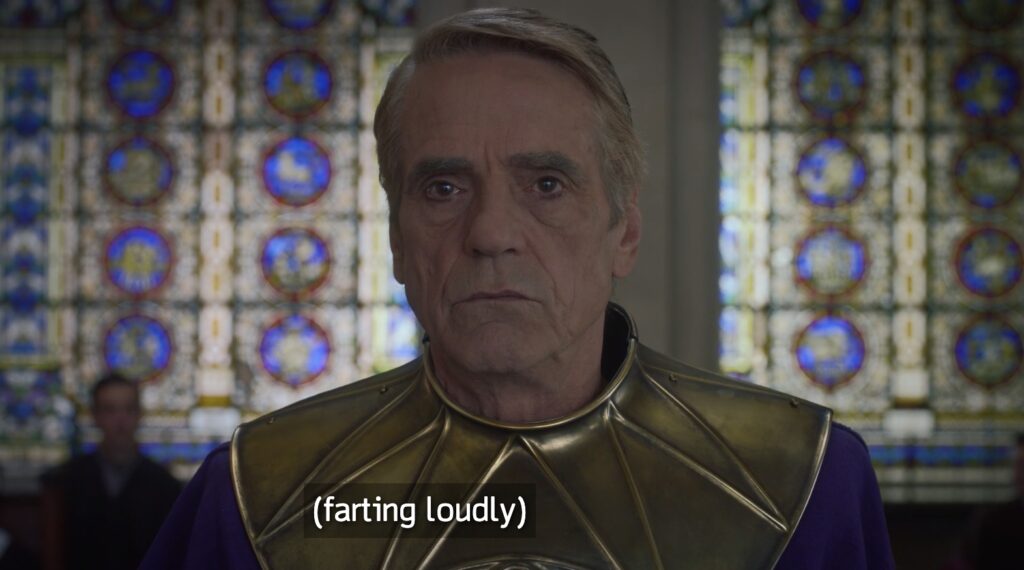Plenty of writers hate to read their old work, or think they could make it better in hindsight. Some creatives will never be satisfied by their output, let alone the way it is received by others. And then there’s Alan Moore, who created the critically-acclaimed Watchmen comic series and absolutely hates the Damon Lindelof adaptation that aired on HBO and was met with near-universal praise.
Moore has not been shy about anything, especially in his disappointment with the 2019 HBO limited series which, unlike the uneven and lengthy 2009 movie of the same name was a significant departure from the original source material. There were changes that delved into systemic racism, and the role of law enforcement, and also added a surprising amount of levity to the proceedings. And all of it worked to the tune of 11 Emmy Awards, including a win for Outstanding Limited Series and acting nods for Regina King and Yahya Abdul-Mateen II.
It also featured scenes like this:
It kicked all kinds of ass is what we’re saying here. Except in the mind of Moore, who this week continued to criticize the work and expressed frustration that he was even bothered for his input on the show. In an interview with GQ, Moore didn’t hold back in calling it “embarrassing” that he was asked for feedback on the most recent adaptation. Moore explained that Lindelof sent him a package and a letter while production started and, well, he wasn’t happy with even being contacted in the first place. He didn’t like Lindelof’s opening line (“Dear Mr. Moore, I am one of the bastards currently destroying Watchmen”) and he especially didn’t like that Lindelof asked him how to pronounce “Ozymandias,” one of the vigilantes on the show
The anecdote about Ozymandias could have been a joke, of course, as that name was a key part of one of the biggest television shows of the last two decades. But still, it was enough to turn Moore further against the project he didn’t even know was happening at the time.
I got back with a very abrupt and probably hostile reply telling him that I’d thought that Warner Brothers were aware that they, nor any of their employees, shouldn’t contact me again for any reason. I explained that I had disowned the work in question, and partly that was because the film industry and the comics industry seemed to have created things that had nothing to do with my work, but which would be associated with it in the public mind. I said, “Look, this is embarrassing to me. I don’t want anything to do with you or your show. Please don’t bother me again.”
Moore is clearly frustrated with what the comic and movie industries have done to his works since they were published, and so no version of Watchmen would make him particularly happy. And he admitted that he hasn’t even watched it. But what seems to bother him most of all is that people keep getting the wrong things out of his work, which has actually tainted the whole of it in his eyes.
When I saw the television industry awards that the Watchmen television show had apparently won, I thought, “Oh, god, perhaps a large part of the public, this is what they think Watchmen was?” They think that it was a dark, gritty, dystopian superhero franchise that was something to do with white supremacism. Did they not understand Watchmen? Watchmen was nearly 40 years ago and was relatively simple in comparison with a lot of my later work. What are the chances that they broadly understood anything since? This tends to make me feel less than fond of those works. They mean a bit less in my heart.
The full GQ interview is worth reading — Moore comes off less angry than merely grappling with how the world views his work. There’s a point in the interview where he laments that right-wing Nazis, for example, take a fascist piece he wrote in V For Vendetta as fact and not satire. It’s tough knowing that not everyone is going to Get It when you make something, but it’s also kind of a bummer that Moore is unable to enjoy a very good show because of all the baggage tied to one of his most notable works.
[via IndieWire]

